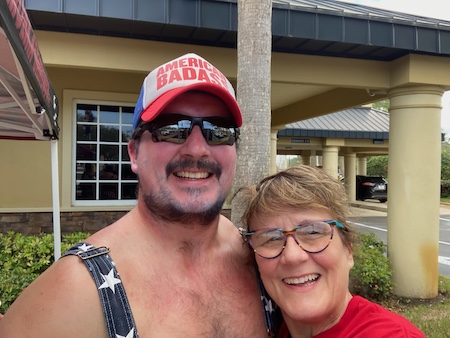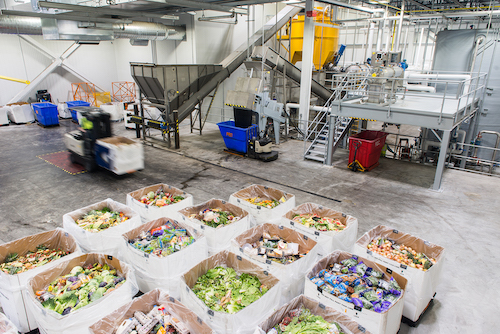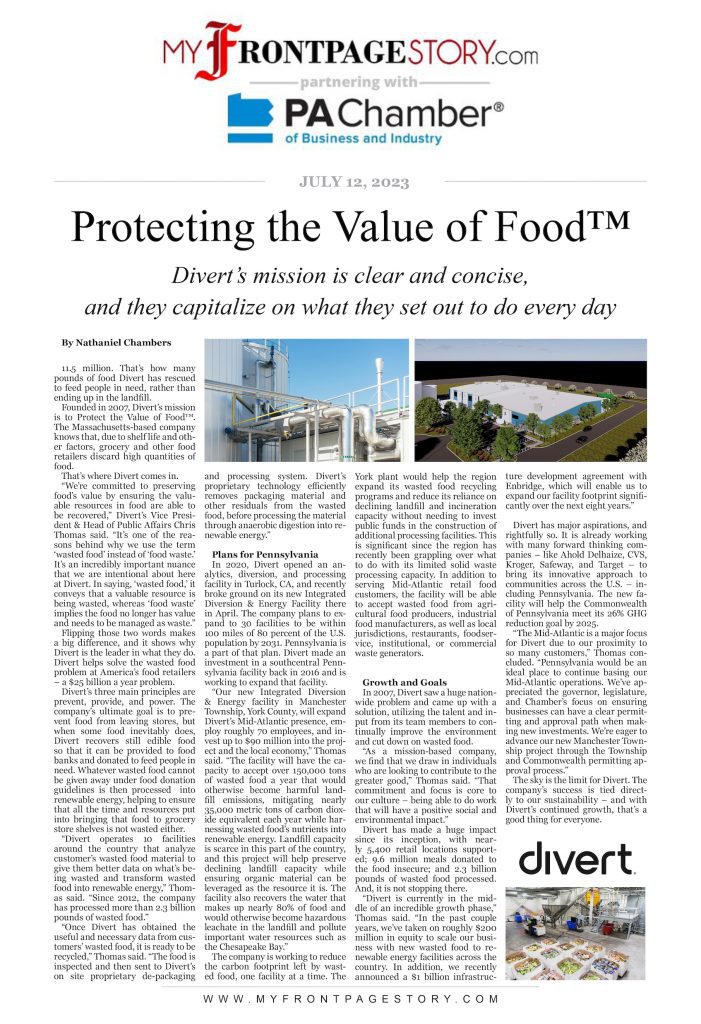
The Art of Personalized Gifts: Ideas to Make It Special
July 20, 2023
Beautiful & Amazing: Michele’s family loves and appreciates so much about her, and it is easy to see why
July 20, 2023Protecting the Value of Food™: Divert’s mission is clear and concise, and they capitalize on what they set out to do every day
11.5 million. That’s how many pounds of food Divert has rescued to feed people in need, rather than ending up in the landfill.
Founded in 2007, Divert’s mission is to Protect the Value of Food™. The Massachusetts-based company knows that, due to shelf life and other factors, grocery and other food retailers discard high quantities of food.
That’s where Divert comes in.
“We’re committed to preserving food’s value by ensuring the valuable resources in food are able to be recovered,” Divert’s Vice President & Head of Public Affairs Chris Thomas said. “It’s one of the reasons behind why we use the term ‘wasted food’ instead of ‘food waste.’ It’s an incredibly important nuance that we are intentional about here at Divert. In saying, ‘wasted food,’ it conveys that a valuable resource is being wasted, whereas ‘food waste’ implies the food no longer has value and needs to be managed as waste.”
Flipping those two words makes a big difference, and it shows why Divert is the leader in what they do. Divert helps solve the wasted food problem at America’s food retailers – a $25 billion a year problem.
Divert’s three main principles are prevent, provide, and power. The company’s ultimate goal is to prevent food from leaving stores, but when some food inevitably does, Divert recovers still edible food so that it can be provided to food banks and donated to feed people in need. Whatever wasted food cannot be given away under food donation guidelines is then processed into renewable energy, helping to ensure that all the time and resources put into bringing that food to grocery store shelves is not wasted either.
“Divert operates 10 facilities around the country that analyze customer’s wasted food material to give them better data on what’s being wasted and transform wasted food into renewable energy,” Thomas said. “Since 2012, the company has processed more than 2.3 billion pounds of wasted food.”
“Once Divert has obtained the useful and necessary data from customers’ wasted food, it is ready to be recycled,” Thomas said. “The food is inspected and then sent to Divert’s on site proprietary de-packaging and processing system. Divert’s proprietary technology efficiently removes packaging material and other residuals from the wasted food, before processing the material through anaerobic digestion into renewable energy.”
Plans for Pennsylvania
In 2020, Divert opened an analytics, diversion, and processing facility in Turlock, CA, and recently broke ground on its new Integrated Diversion & Energy Facility there in April. The company plans to expand to 30 facilities to be within 100 miles of 80 percent of the U.S. population by 2031. Pennsylvania is a part of that plan. Divert made an investment in a southcentral Pennsylvania facility back in 2016 and is working to expand that facility.
“Our new Integrated Diversion & Energy facility in Manchester Township, York County, will expand Divert’s Mid-Atlantic presence, employ roughly 70 employees, and invest up to $90 million into the project and the local economy,” Thomas said. “The facility will have the capacity to accept over 150,000 tons of wasted food a year that would otherwise become harmful landfill emissions, mitigating nearly 35,000 metric tons of carbon dioxide equivalent each year while harnessing wasted food’s nutrients into renewable energy. Landfill capacity is scarce in this part of the country, and this project will help preserve declining landfill capacity while ensuring organic material can be leveraged as the resource it is. The facility also recovers the water that makes up nearly 80% of food and would otherwise become hazardous leachate in the landfill and pollute important water resources such as the Chesapeake Bay.”
The company is working to reduce the carbon footprint left by wasted food, one facility at a time. The York plant would help the region expand its wasted food recycling programs and reduce its reliance on declining landfill and incineration capacity without needing to invest public funds in the construction of additional processing facilities. This is significant since the region has recently been grappling over what to do with its limited solid waste processing capacity. In addition to serving Mid-Atlantic retail food customers, the facility will be able to accept wasted food from agricultural food producers, industrial food manufacturers, as well as local jurisdictions, restaurants, foodservice, institutional, or commercial waste generators.
Growth and Goals
In 2007, Divert saw a huge nationwide problem and came up with a solution, utilizing the talent and input from its team members to continually improve the environment and cut down on wasted food.
“As a mission-based company, we find that we draw in individuals who are looking to contribute to the greater good,” Thomas said. “That commitment and focus is core to our culture – being able to do work that will have a positive social and environmental impact.”
Divert has made a huge impact since its inception, with nearly 5,400 retail locations supported; 9.6 million meals donated to the food insecure; and 2.3 billion pounds of wasted food processed. And, it is not stopping there.
“Divert is currently in the middle of an incredible growth phase,” Thomas said. “In the past couple years, we’ve taken on roughly $200 million in equity to scale our business with new wasted food to renewable energy facilities across the country. In addition, we recently announced a $1 billion infrastructure development agreement with Enbridge, which will enable us to expand our facility footprint significantly over the next eight years.”
Divert has major aspirations, and rightfully so. It is already working with many forward thinking companies – like Ahold Delhaize, CVS, Kroger, Safeway, and Target – to bring its innovative approach to communities across the U.S. – including Pennsylvania. The new facility will help the Commonwealth of Pennsylvania meet its 26% GHG reduction goal by 2025.
“The Mid-Atlantic is a major focus for Divert due to our proximity to so many customers,” Thomas concluded. “Pennsylvania would be an ideal place to continue basing our Mid-Atlantic operations. We’ve appreciated the governor, legislature, and Chamber’s focus on ensuring businesses can have a clear permitting and approval path when making new investments. We’re eager to advance our new Manchester Township project through the Township and Commonwealth permitting approval process.”
The sky is the limit for Divert. The company’s success is tied directly to our sustainability – and with Divert’s continued growth, that’s a good thing for everyone.





